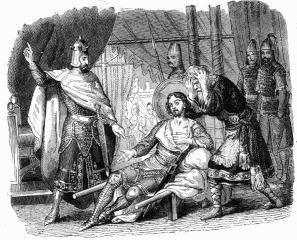 W
WAdelchi is the second tragedy written by Alessandro Manzoni. It was first published in 1822.
 W
WThe Bust of Charlemagne is a reliquary from around 1350 which contains the top part of Charlemagne's skull. The reliquary is part of the treasure kept in the Aachen Cathedral Treasury. Made in the Mosan region, long a centre of high-quality metalwork, the bust is a masterpiece both of late Gothic metalwork and of figural sculpture.
 W
WCharlemagne et ses Leudes, often translated as Charlemagne and His Guards, is a statue situated in the plaza of Notre-Dame, in the 4th arrondissement of Paris, France. It is a work by the French sculptors Charles Rochet and Louis Rochet, and the art foundry Fonderie Thiébaut Frères.
 W
WCharlemagne: By the Sword and the Cross is a symphonic metal concept album by actor and singer Christopher Lee. It was released on 15 March 2010. This was Lee's first full-length album, having previously worked with such bands as Rhapsody of Fire and Manowar. The album won the "Spirit of Metal" award from the 2010 Metal Hammer Golden Gods Awards ceremony. The award was presented to him by Black Sabbath's Tony Iommi.
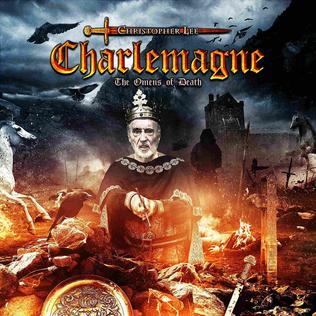 W
WCharlemagne: The Omens of Death is the fourth and final album by actor and heavy metal singer Christopher Lee. It was released on 27 May 2013. It is a sequel to his album Charlemagne: By the Sword and the Cross (2010). The music was arranged by Judas Priest's Richie Faulkner, and features prominent Guatemalan guitar virtuoso and World Guitar Idol Champion Hedras Ramos on guitar, as well as his father, Hedras Ramos Sr, on bass.
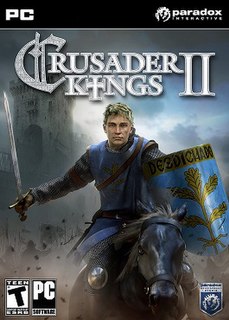 W
WCrusader Kings II is a grand strategy game set in the Middle Ages, developed by Paradox Development Studio and published by Paradox Interactive as a sequel to Crusader Kings. The game was released on February 14, 2012. A sequel, Crusader Kings III, was released on September 1, 2020. Crusader Kings II stood out from earlier Paradox Interactive games in that it attracted a more widespread audience, contributing to the growth of the company.
 W
WElegast is the hero and noble robber in the poem Karel ende Elegast, an early Middle Dutch epic poem that has been translated into English as Charlemagne and Elbegast. In the poem, he possibly represents the King of the Elves. He appears as a knight on a black horse, an outcast vassal of Charlemagne living in the forest. The original Dutch poem uses the name Elegast, while translated versions of the poem commonly use the name Elbegast in German and English, or Alegast in the Scandinavian ballad.
 W
WThe Equestrian statue of Charlemagne (1725), which portrays the Holy Roman Emperor Charlemagne (742–814), was commissioned by Pope Clement XI (1649–1721) and carved by the Italian artist Agostino Cornacchini (1686–1754). It stands to the left of the portico of St Peter's Basilica.
 W
WA Carolingian-era equestrian statuette in bronze depicting either Charlemagne or his grandson Charles the Bald, a rare example of surviving Carolingian sculpture in metal, is exhibited in the Louvre Museum. In the 16th, 17th and 18th centuries it was kept in Metz Cathedral.
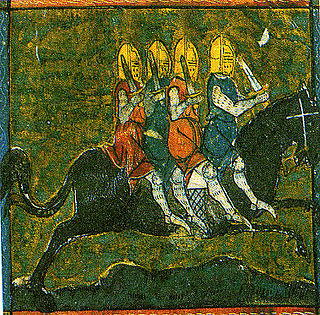 W
WThe Four Sons of Aymon, sometimes also referred to as Renaud de Montauban is a medieval tale spun around the four sons of Duke Aymon: the knight Renaud de Montauban, his brothers Guichard, Allard and Richardet, their magical horse Bayard, their adventures and revolt against the emperor Charlemagne. The story had a European success and echoes of the story are still found today in certain folklore traditions.
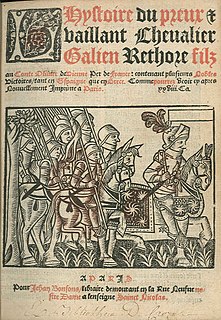 W
WGaliens li Restorés, or Galien le Restoré or Galien rhétoré, is an Old French chanson de geste which borrows heavily from chivalric romance. Its composition dates anywhere from the end of the twelfth century to the middle of the fourteenth century. Five versions of the tale are extant, dating from the fifteenth century to the sixteenth century, one in verse and the others in prose. The story—which is closely linked to the earlier chansons de geste Pèlerinage de Charlemagne and The Song of Roland —tells of the adventures of Galien, son of the hero Olivier and of Jacqueline, the daughter of the (fictional) emperor Hugon of Constantinople.
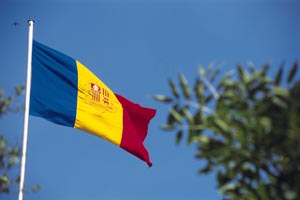 W
W"El Gran Carlemany" is the national anthem of the Principality of Andorra. Enric Marfany Bons composed the music, while the lyrics were authored by Joan Benlloch i Vivó, written in a first-person narrative. It was adopted as the national anthem on September 8, 1921, which is also the national day of Andorra. The lyrics make reference to several key aspects of Andorran culture and history, such as the heritage of the Carolingian Empire.
 W
WKarolus magnus et Leo papa, sometimes called the Paderborn Epic or the Aachen Epic, is a Carolingian Latin epic poem of which only the third of four books is extant. It recounts the meeting of Charlemagne, king of the Franks, with Pope Leo III, in AD 799.
 W
WThe Nine Worthies are nine historical, scriptural, and legendary personages who personify the ideals of chivalry established in the Middle Ages, whose lives were deemed a valuable study for aspirants to chivalric status. All were commonly referred to as 'Princes', regardless of their historical titles. In French they are called Les Neuf Preux or "Nine Valiants", giving a more specific idea of the moral virtues they exemplified: those of soldierly courage and generalship. In Italy they are i Nove Prodi.
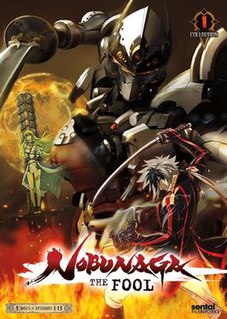 W
WNobunaga the Fool is a Japanese stage play and anime series, part of a wider franchise titled The Fool by anime creator Shōji Kawamori. The play is a combination of live actors produced by Avex Live Creative and animation by Satelight, first performed on December 8, 2013. The anime series is also animated by Satelight and began airing on January 5, 2014 and ended June 22, 2014.
 W
WOrlando furioso is an Italian epic poem by Ludovico Ariosto which has exerted a wide influence on later culture. The earliest version appeared in 1516, although the poem was not published in its complete form until 1532. Orlando Furioso is a continuation of Matteo Maria Boiardo's unfinished romance Orlando Innamorato. In its historical setting and characters, it shares some features with the Old French Chanson de Roland of the eleventh century, which tells of the death of Roland. The story is also a chivalric romance which stemmed from a tradition beginning in the late Middle Ages and continuing in popularity in the 16th century and well into the 17th.
 W
WOrlando Innamorato is an epic poem written by the Italian Renaissance author Matteo Maria Boiardo. The poem is a romance concerning the heroic knight Orlando (Roland). It was published between 1483 and 1495.
 W
WPippin is a 1972 musical with music and lyrics by Stephen Schwartz and a book by Roger O. Hirson. Bob Fosse, who directed the original Broadway production, also contributed to the libretto. The musical uses the premise of a mysterious performance troupe, led by a Leading Player, to tell the story of Pippin, a young prince on his search for meaning and significance.
 W
WRoland the Mighty is a 1956 Italian film directed by Pietro Francisci. about the Battle of Roncevaux Pass in AD 778, where Roland, a knight in the service of Charlemagne was killed while defending the rear-guard of the Frankish army as it retreated across the Pyrenees.
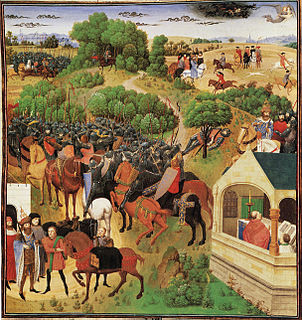 W
WThe Song of Roland is an 11th-century epic poem based on the Battle of Roncevaux Pass in 778, during the reign of Charlemagne. It is the oldest surviving major work of French literature and exists in various manuscript versions, which testify to its enormous and enduring popularity in the 12th to 16th centuries.